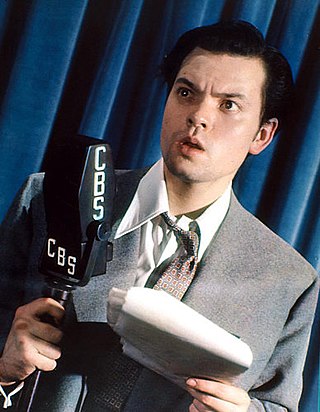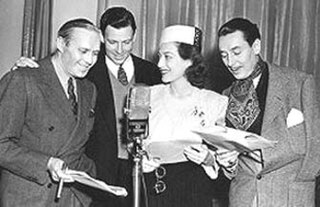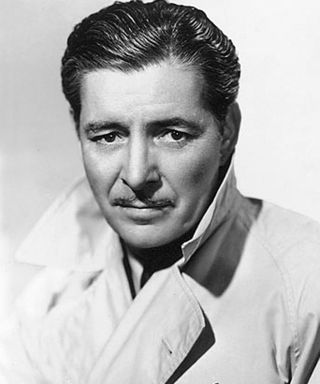| Genre | Anthology |
|---|---|
| Running time | 30 minutes |
| Country of origin | United States |
| Language(s) | English |
| Home station | WMAQ WGN |
| Syndicates | Mutual ABC NBC CBC |
| Starring | Olan Soule Harry Elders Nannette Sargent Beverly Younger |
| Announcer | Don Gordon Myron (Mike) Wallace |
| Directed by | Blair Walliser) Harry Holcomb Norman Felton |
| Original release | July 22, 1938 – March 29, 1950 |
Curtain Time is a radio anthology program in the United States. It was broadcast on ABC, CBS Mutual, and NBC during the old-time radio era, beginning in 1938 and ending in 1950. [1]
Curtain Time was much like The First Nighter Program [2] in that it simulated a theatrical environment "where listeners were invited to attend the evening's performance." [1]
In 1935, Curtain Time was carried on WMAQ in Chicago, Illinois. [3] By October 1937, it had moved to WGN, also in Chicago. [4] An item in the trade publication Broadcasting in 1938 noted, "[I]t is understood that the show may be extended nationally in late summer." [5]
Beginning October 14, 1938, Curtain Time was carried on the Don Lee network as well as on WGN. An item in Broadcasting reported that General Mills had begun a 52-week sponsorship of Curtain Time for its Korn Kix cereal. [6]
Olan Soule, who later starred in a similar show, The First Nighter Program, usually had the male lead in this season's episodes. The female leads varied, but they included Betty Lou Gerson and Louise Fitch. [7] Other cast members included Alice Hill. [8] Don Gordon was the announcer, and Blair Walliser was the director. Henry Weber directed the music. [7]
Harry Elders was the regular male lead, [7] with Beverly Younger [9] and Nannette Sergeant splitting durites as female leads in this iteration of Curtain Time, which was sponsored by Mars, Incorporated. It was carried on ABC July 4, 1945 – June 27, 1946, and on NBC July 13, 1946 – March 29, 1950. [7] The program was also heard in Canada via 29 CBC Trans-Canada stations. [10] During the 1946–1947 season, Canadian coverage moved "from 28 CBS Trans-Canada stations to 44 Dominion stations." [11]
Others often heard in the cast were Betty Winkler, George Cisar, Beryl Vaughn, Sunda Love, Sidney Ellstrom, Maurice Copeland, and Michael Romano. Hosts included Patrick Allen, [7] Vincent Pelletier, [12] and Lew Valentine. [13] Mike Wallace (billed as Myron Wallace) was the announcer. [7] Norman Felton [9] and Harry Holcomb were directors. [7] Porter Heaps and Burt Farber were music directors. [14]

The Mutual Broadcasting System was an American commercial radio network in operation from 1934 to 1999. In the golden age of U.S. radio drama, Mutual was best known as the original network home of The Lone Ranger and The Adventures of Superman and as the long-time radio residence of The Shadow. For many years, it was a national broadcaster for Major League Baseball, the National Football League, and Notre Dame Fighting Irish football. From the 1930s until the network's dissolution in 1999, Mutual ran a respected news service along with a variety of lauded news and commentary programs. In the 1970s, Mutual pioneered the nationwide late night call-in talk radio program, introducing the country to Larry King and later, Jim Bohannon.
WGN-TV is a television station in Chicago, Illinois, United States, serving as the local outlet for The CW. It is owned and operated by the network's majority owner, Nexstar Media Group, and is sister to the company's sole radio property, news/talk/sports station WGN. WGN-TV's studios are located on West Bradley Place in Chicago's North Center community; as such, it is the only major commercial television station in Chicago which bases its main studio outside the Loop. Its transmitter is located atop the Willis Tower in the Loop.
WGN is a commercial AM radio station in Chicago, Illinois, featuring a talk radio format. WGN's studios are in the Chicago Loop, while the transmitter is in Elk Grove Village. WGN also features broadcasts of Chicago Blackhawks hockey and Northwestern University football and basketball.

The Campbell Playhouse (1938–1940) was a live CBS radio drama series directed by and starring Orson Welles. Produced by Welles and John Houseman, it was a sponsored continuation of The Mercury Theatre on the Air. The series offered hour-long adaptations of classic plays and novels, as well as adaptations of popular motion pictures.

Tribune Broadcasting Company, LLC was an American media company which operated as a subsidiary of Tribune Media, a media conglomerate based in Chicago, Illinois. The group owned and operated television and radio stations throughout the United States, as well as full- or partial-ownership of cable television and national digital subchannel networks.

The National Broadcasting Company's NBC Radio Network was an American commercial radio network which was in continuous operation from 1926 through 1999. Along with the NBC Blue Network, it was one of the first two nationwide networks established in the United States. Its major competitors were the Columbia Broadcasting System (CBS), founded in 1927, and the Mutual Broadcasting System, founded in 1934. In 1942, NBC was required to divest one of its national networks, so it sold NBC Blue, which was soon renamed the American Broadcasting Company (ABC). After this separation, the Red Network continued as the NBC Radio Network.
The year 1949 saw a number of significant events in radio broadcasting history.
The year 1938 saw a number of significant events in radio broadcasting.
The year 1931 saw a number of significant events in radio broadcasting history.

The Screen Guild Theater is a radio anthology series broadcast from 1939 until 1952 during the Golden Age of Radio. Leading Hollywood stars performed adaptations of popular motion pictures. Originating on CBS Radio, it aired under several different titles including The Gulf Screen Guild Show, The Gulf Screen Guild Theater, The Lady Esther Screen Guild Theater and The Camel Screen Guild Players. Fees that would ordinarily have been paid to the stars and studios were instead donated to the Motion Picture Relief Fund, and were used for the construction and maintenance of the Motion Picture Country House.
Chicago Theater of the Air was a weekly American radio program that featured hour-long operettas & musical theater. It first ran locally in May 1940 on WGN radio in Chicago and then nationally as an unsponsored show on the Mutual Broadcasting System from October 5, 1940, to September 11, 1954.

Gene Autry's Melody Ranch is a Western variety radio show in the United States. A 15-minute pilot show aired on December 31, 1939. The program ran from January 7, 1940 to August 1, 1943, and from September 23, 1945 to May 16, 1956. The show's entire run was broadcast over the CBS radio network, sponsored by Doublemint gum. The approximately two-year interruption resulted from Autry's enlistment in the United States Army to serve in World War II. Initially titled Doublemint's Melody Ranch, the show's name was changed to Gene Autry's Melody Ranch in early 1941. Episodes were 30 minutes long except for a 15-minute version that ran from September 23, 1945 to June 16, 1946. The theme song was "Back in the Saddle Again".

Dick Joy was an American radio and television announcer. A journalism major at the University of Southern California, he went on to become well known on network radio and television.
Hollywood Star Playhouse is a radio dramatic anthology series in the United States. It was broadcast April 24, 1950-February 15, 1953, appearing on CBS, ABC and NBC over that span.
For the interview program of the same name, see Hollywood Star Time .

For the television series of the same name, see The Silver Theatre.
Valiant Lady is an American radio soap opera that was broadcast on ABC, CBS, and NBC at various times from March 7, 1938, through August 23, 1946, and later between October 8, 1951, and February 19, 1952.
Brownstone Theater is an old-time radio dramatic anthology series in the United States. It was broadcast on the Mutual Broadcasting System February 21, 1945 – September 23, 1945.

Favorite Story is an American old-time radio dramatic anthology. It was nationally syndicated by the Ziv Company from 1946 to 1949. The program was "advertised as a show that 'stands head and shoulders above the finest programs on the air'". Originating at KFI in Los Angeles, California, Favorite Story apparently was not related to the similarly named My Favorite Story that ran on KNX in Los Angeles earlier.